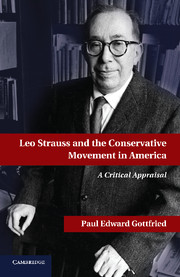4 - The Method under Assault
Published online by Cambridge University Press: 05 January 2012
Summary
A Variety of Critics
The critics of Strauss and his followers can be easily divided into three groups. The first consists of those whom Strauss’s devotees are more than willing to address and who would seem to be their most formidable opponents. Shadia Drury, Anne Norton, Alan Wolfe, Nick Xenos, and John McCormick are all anti-Straussians we are meant to respect. It is they who arouse the combative energy of Michael and Catherine Zuckert, Peter Minowitz, David Lewis Schaefer, and other movement adepts. Although Strauss’s apologists do not coddle these critics, they consider some of them to be pesky but “brilliant” adversaries.
It is also the case that Straussians can counter most of these foes without working up a sweat. They have effectively taken on Drury, Xenos, and Wolfe for closely linking Strauss to Carl Schmitt and other right-wing thinkers without adequate proof. They have had no trouble disproving the charge that Strauss cultivated fascist friends because of his long-standing friendship with Kojève, who visited Carl Schmitt at his home in Plettenberg.
- Type
- Chapter
- Information
- Leo Strauss and the Conservative Movement in America , pp. 68 - 105Publisher: Cambridge University PressPrint publication year: 2011



